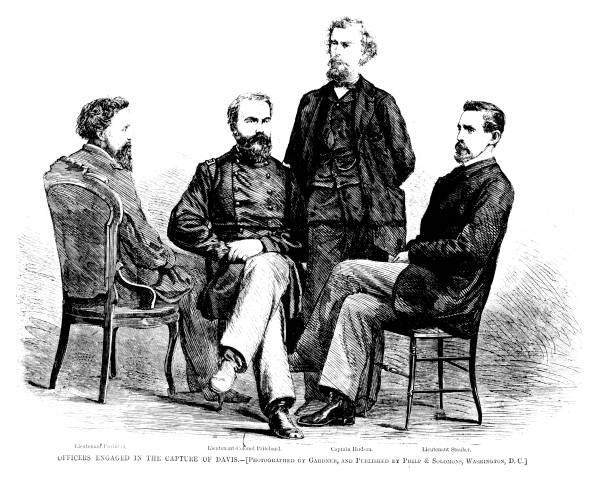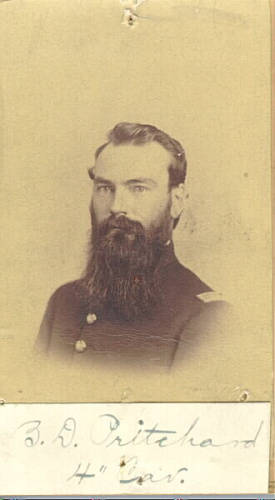
Drawing courtesy Archives of MI 4 MI Cavalry, Co. L.
The four men who captured President Davis, C. S. A.
Lieutenant Purinto, Lieutenant Colonel Benjamin Pritchard, Captain Hudson, and Lieutenant Stauber

Photo courtesy Archives of MI.
Courtesy Archives of MI 4 MI Cavalry, Co. L.
Pritchard enlisted from Allegan, MI.
Benjamin D. Pritchard
.
Benjamin Pritchard is most famous for his role in capturing President Jefferson Davis, C. S. A. on May 10, 1865, at Irwinville, Georgia. Pritchard was promoted to Brigadier General for his role in the capture. After the war, Pritchard became a banker and Treasurer of the State of Michigan. Pritchard enlisted from Allegan, MI.He is buried in Allegan, Michigan.
Pritchard was born January 29, 1835, in rural Nelson, Ohio. He studied at Hiram College, where his instructor was James A. Garfield, who would later serve as U. S. President.
In 1856, Pritchard went to Allegan, Michigan, where he studied law and taught for the Allegan Public Schools. In 1858, he continued his studies at the University of Michigan, where he studied law, graduated, and was admitted to the bar in 1860. When he returned to Allegan, he partnered with Judge Williams to establish a law practice.
In 1862, Pritchard and Judge Williams both enlisted in the Union Army in the 4th Michigan Cavalry.
On September 1, 1864, Pritchard married Mary Bently Kent. They honeymooned in Allegan before Pritchard returned to his regiment.
It was learned that the Davis fleeing party had crossed the ferry over the Ocmulgee River and was moving southward toward Irwinville, 30 miles below Abbeyville and 100 miles south of Macon. Lieutenant Colonel Pritchard marched the regiment down the river road, and after a 30 mile ride, reached Irwinville late in the night. There he learned that he was in advance of the Davis party.
One of Pritchardís officers, Corp. Munger, of Allegan, Michigan, soon discovered the Confederate presidentís encampment. He noticed two women moving rapidly away from the camp as the 4th
Michigan approached and thought they looked suspicious, so he stopped them and asked that they remove their coats. Upon doing so, it was revealed that the two "women" were Jefferson Davis and his wife, both wearing womenís cloaks and shawls trying to escape. (The cloak and shawl worn by the Confederate president are now the property of the National Archives.) A number of cartoons appeared in the public during the weeks and months that followed chiding Davis for the attire he was captured in.
Pritchard insisted on giving credit to all who played a role in the capture. He recommended that the following men be given brevet promotions: Captain Hathaway, Captain Hudson, Lieutenant Stauber and Henry Boutell; Lieutenants Purinton, Dickinson, Davis and Bennent; Corporals Munger and Crittendon; Privates Bullard, Bee and Edward.
As his reward for making the capture, Colonel Pritchard was brevetted out of the service as brigadier general and given a $3,000 share of the bounty which President Johnson had offered for the apprehension of Davis.
Following the war, Pritchard returned to Allegan, where he resumed his law partnership with Judge Williams, continuing the practice until 1868. He had a daughter, Bertha Edna, and a son, Harry.
He served two terms of office as the State Treasurer of Michigan, from 1880 to 1884.
He organized the First National Bank of Allegan and served as president until 1905. He then relinquished his shares in that bank and founded the First State Bank which was the first savings bank, offering a 4% interest to depositors.
Pritchard died on November 26, 1907, and was buried in Oakwood Cemetery, in Allegan, Michigan, on November 29, 1907. The Grand Army of the Republic, the Rev. William Lucas of the local Episcopal Church, and the Rev. A. V. Brashear of the local Presbyterian Church officiated. Over 600 people attended the service.